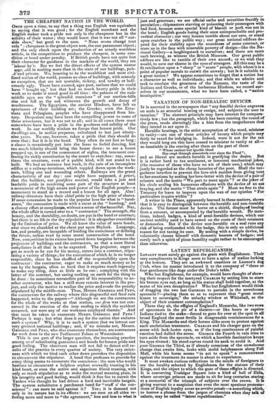LATENT REPUBLICANISM.
LOYALTY mug surely go against the grain with Englishmen. Their very compliments to Kings seem to have a spice of malice lurking at the bottom. They are as awkward courtiers as Launce's dog Crab, when its master introduced it to the company of "three or four gentlemen-like dogs under the Duke's table. Who but Englishmen, for example, would have thought of show- ing their respect for the martyred CHARLES by setting him to stare his bronze eyes out, as long as his statue shall hold together, at the scene of his own decapitation? Who but Englishmen would think of dragging the two last GEORGES to partake in the unwelcome spectacle ?—placing them so as to represent that "great moral lesson to sovereigns," the unlucky window at Whitehall, as the object of their constant contemplation ? There they sit, the effigies of England's Monarchs, like two rows of spectators in the pit of a theatre—or like bears or captive Indians tied to the stake—forced to gaze for ever at the spot in all broad England the most fertile in disagreeable reminiscences for a King. The Monarchs and their horses alike seem to protest against such unchristian treatment. CHARLES and his charger gaze on the scene with lack-lustre eyes, as if the long continuance of painful emotion had dulled the sense. GEORGE the Fourth in vain tries to turn aside from the spectacle, on which a horrible fascination keeps his eyes riveted : his steed curves round its neck to avoid it. And poor GEORGE the Third, as if already conscious of the unwelcome change that awaits him, looks with stolid helplessness along Pall Mall, while his horse seems "in act to speak" a remonstrance against the treatment its master is about to experience.
It must awaken curious reflections in the minds of foreigners to see the locality selected by Englishmen for the statues of their Kings, and the object to which the gaze of these effigies is directed. It is converting Trafalgar Square into a kind of hall of Eblis, where sovereign princes are made to sit for long centuries staring at a memorial of the triumph of subjects over the crown. It is giving warrant to a suspicion that even the most specious protesta- tions of English loyalty cover an arriirepetzsee—a something which, to borrow a phrase from the jargon of chemists when they talk of caloric, may be called "latent republicanism."


























 Previous page
Previous page